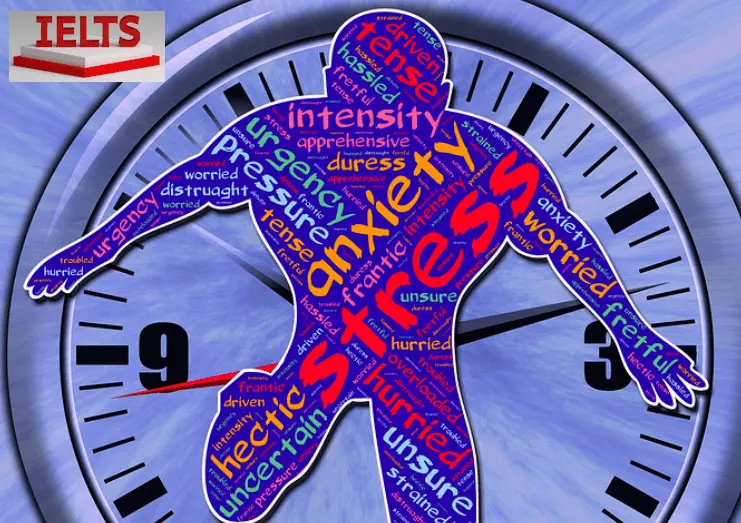IELTS is so hard because it is a test designed to push your English ability as far as it will go. This means that at some point you will reach a point where you can no longer complete the the questions effectively. Not everyone will always be aware they have reached that point but those that do will feel as though the test is hard.
The whole idea of gaining a good IELTS band score is so that you can prove to a future employer, university, immigration department, or whosoever that your English is going to be good enough to deal with the situations you might encounter in a new job, or university course in an English speaking country.
Each of those different organisations will require a different band score. For example, Cambridge University requires candidates to get an overall band score of 7.0, where as, Manchester University require a band 6.0 .
Without a hard test that really pushed candidates then how would you be able to know someone’s true level of English.
By the way, you can view a full list or required band scores for UK universities here.
So, rather than question, ‘why is IELTS so hard?’ (although I know it really sucks having to spend time and money doing this) We should probably be happy that it is a ‘hard’ test because otherwise we would not be able to prove how good our level of English is.
There are a number of factors, however, that do make the test feel hard regardless of how good your level of English is and here are a few of those factors and how to deal with them listed below:
Want To Fast Track Your Way To A Band 7 Or Higher? Then Grab My Course!

Reasons Why The IELTS Exam Is Difficult AND The Solutions..
Reason 1: The listening test is 30 minutes long and many people find it hard to concentrate and focus on a second language for 30 minutes without stopping.
Solution: Get used to doing this before you take the test. Take several full listening tests no preparation for test day so you are already used to this length of time.
Reason 2: Candidates often complain that they cannot think of a good idea to say in the speaking test or write in the IELTS essay.
Solution: Chill out, you are not graded on how interesting or original your answer is. That is simply not important. What is important is that you express yourself clearly and accurately throughout.
To help with generating ideas though, you should regularly read informative newspapers and watch documentaries and news channels to provide you with ideas of what to talk about. You could try:
Check out our full listening guide here.
Problem 3: Some test takers say they never have enough time to finish their writing tasks in time.
Solution: The IELTS test follows the same format every time. This is a big bonus as it means that you should know how long to spend on each part of the writing test and even how long to spend on each paragraphs of the test. You need to develop a routine you can follow for each question type.
Check out our full IELTS essay guide here.
Problem 4: There are too many difficult words in the reading section.
Solution: You should enter the test knowing that you will not understand all of the words in the paper. When you come across them you simply guess what they might mean from what is written before and after the word.
Of course, you should prepare for the test as best as you can by learning more vocabulary. Reading is one of the best ways to do this, read something you enjoy, regularly.

Problem 5: Nerves, this is a big one, nerves make it really hard for test takers.
Solution: If you prepare properly, well in advance of the test, you will be far less nervous. If you know the style and the format of the question you will be less nervous, and if you do a full practice test under timed conditions you will be le0ss nervous.
Do all of these things together and you should feel much more positive about the test and it will seem less difficult too!
Problem 6: The speakers speak too fast in the listening test and you hear them speak only once.
Solution: Understand, that you will probably not understand, or even hear every word 100%, when you realise that this is normal, then it should not alarm you as much.
However, you do have to use some coping strategies so that you can make it through the test.
So, make sure you have warmed up your listening skills on the way to the test centre with a past paper, or news from the radio. Do remember that you will hear question answers in the order that they appear on the paper.
This means it is important to underline keywords in each question. If you do this you will know what each question is about, and so when they talk about that topic, you will know to move on and you won’t get lost or keep waiting for the answer to a previous question when it might have passed already!
Want To Fast Track Your Way To A Band 7 Or Higher? Then Grab My Course!

Problem 7: The ‘academic language’ is too difficult to understand because I do not see or hear that academic type of language often.
Solution: You will definitely want to brush up on your academic language skills, especially if you are taking the IELTS Academic module.
Here is a great resource to use: www.phrasebank.manchester.ac.uk it provides you with sentence starters for all different types of academic writing.
I suggest you go through and learn two or three set phrases for each of the different headings listed on the left of the page. You can also read some academic journals about any topic you are interested in by searching using scholar.google.com, this will give you plenty of material.

Problem 8: Part 2 of the speaking test is difficult as you have to speak on your own about a random topic you are provided with. It can be hard to come up with ideas and speak about those bullet points.
Solution: Two things, firstly you do not have to stick strictly to those bullet points you can talk about anything else that is related in someway to the bullet points so don’t worry about going off topic.
Going ‘off topic’ is only really a problem in the writing tasks where you must strictly focus on answering the question but in speaking part 2 it is not so strict.
Two really good strategies to help you speak for the full two minutes are to try and tell a related story to the bullet points. Stories are great because they give you a series of events to explain which takes time and shows off your language skill.
Secondly, talking about real life experiences and examples related to the bullet points is awesome too. This can help show off your vocabulary as you will be able to explain in detail what you are talking about as you were really there.
Thirdly, use your senses, whatever you are asked to talk about can you draw in your sense of sight, smell, taste, touch and hearing, this is another effective method.
Problem 9: You don’t know what you are doing wrong! Many candidates have to redo the test over and over again until they get the score they need and often that’s simply because they do not know what the problem is with their work.
Solution: for this you really need to get a teacher with experience of the IELTS exam to check your work, or even better get an IELTS examiner to tell you exactly what you are doing wrong and how to fix it. If you do not know any IELTS teachers personally then I highly recommend using this team of examiners here who on average increase a candidates band score by up to 1.5 bands just through using their feedback and advice, definitely check it out!
Problem 10: The ‘ IELTS exam is too hard attitude’. I meet these people often, they simply think that IELTS is some kind of evil magic spell that can never be undone when really nothing can be further form the truth.
Solution: Change your attitude. IELTS can be a hard test for all the reasons given above but by being positive and proactive in your preparation then you can beat this test!
First, you need to realise that you and only you have the power to change your band score. Do some practice tests, get feedback on them from proper IELTS teachers/examiners, fix your mistakes and try again. This process works so stick to it and you will get there!
Where To Next If You Think The Test Is Still Too Hard?
Well, you should definitely go through the resources on this site. We have guides for all parts of the test. Simply use the top navigation bar to go to the relevant part of the exam that you want to improve.
I really want you to succeed so I am begging you to take my advice seriously. Let’s not give IELTS any more money! And let’s get you on the way to the future you deserve!
Recommended IELTS Study Tools
Thank you for reading this article. I always get lots of questions about how else to get a better band score quickly. So, this is what I recommend:
Complete IELTS Course: Of course, my full course ‘INCREASE YOUR IELTS‘ covers everything you need to need to know to pass IELTS, including practice questions, model answers, grammar work, strategies for every possible reading, writing and listening question type, as well as a complete speaking course too, check it out here.
IELTS Essay and Speaking Feedback: To complete full mock tests and get feedback from IELTS examiners on your IELTS essays or speaking tasks then visit: IELTS Feedback and Mock Tests, here.
Improve your grammar fast by using the Grammarly suggestions to improve your writing. Every IELTS students should have this free grammar improving tool.
Improve all-round English skill with EnglishClass101.com. If you have failed IELTS more than once then you probably need to improve your general level of English. Use the free online lessons and vocabulary building tools here and start improving today! HIGHLY RECOMMENDED!





